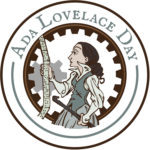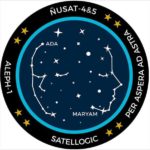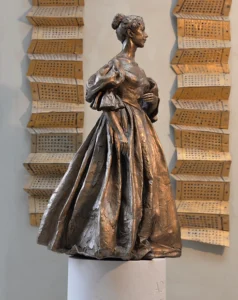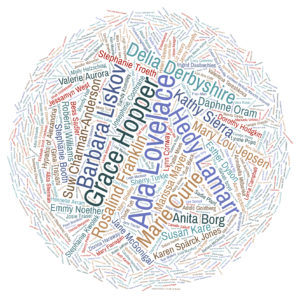 In celebration of Ada Lovelace Day’s 10th year, we would like to look back on all the groups and individuals that have honoured Ada Lovelace over the years. With that in mind, we’ve created a timeline of books, academic research, events, projects, films, documentaries and many other activities, to try and capture all the contributions that have helped make Ada and her achievements more recognised.
In celebration of Ada Lovelace Day’s 10th year, we would like to look back on all the groups and individuals that have honoured Ada Lovelace over the years. With that in mind, we’ve created a timeline of books, academic research, events, projects, films, documentaries and many other activities, to try and capture all the contributions that have helped make Ada and her achievements more recognised.
1950 – Computing Machinery and Intelligence, AM Turing, Mind, Volume LIX, Issue 236, 1 October 1950, Pages 433–460.
– This is Alan Turing’s seminal piece on artificial intelligence, in which he discusses Lady Lovelace’s Objection.
1980 – The ADA programming language
– A computing language designed by Jean Ichbiah at CII Honeywell Bull, for the US Department of Defense.
1985 – Ada: A Life and a Legacy
– A biographical book on Ada Lovelace, by Dorothy Stein, reviewed by Garry J. Tee.
1990 – The Difference Engine
– An alternative history fiction book, by William Gibson and Bruce Sterling that includes Ada Lovelace as a character, giving a lecture in France.
1994 – The Ada Project
– An online project for information and resources about women in computing (found here).
1997 – Conceiving Ada
– A film about a computer scientist who becomes obsessed with communicating with Ada Lovelace, starring Tilda Swinton as Ada.
1997 – Zeros and Ones: Digital Women and the New Technoculture
– A book by Sadie Plant exploring technology and women, featuring Ada Lovelace, reviewed by Nina Wakeford for New Scientist.
1998 – The Lovelace Medal
– An award established by the British Computing Society (BCS) for outstanding contributions to computer science.
1999 – The Bride of Science: Romance, Reason and Byron’s Daughter
– A biography by Benjamin Woolley, reviewed by John Zukowski.
2001 – Ada Lovelace: The Computing Wizard of Victorian England
– This is a children’s book by Lucy Lethbridge.
2004 – Lovelace & Babbage and the creation of the 1843 ‘notes’, J. Fuegi and J. Francis, IEEE Annals of the History of Computing, vol. 25, no. 4, pp. 16-26, Oct.-Dec. 2003.
– An academic research paper expanding on Babbage and Lovelace’s work.
2005 – Adafruit
– Online store for electronics products and maker kits, founded by Limor “Ladyada” Fried.
2008 – The Lovelace Colloquium
– An annual one day conference for women computer science students, held by The British Computing Society women group (BCSWomen).

2009 – Ada Lovelace Day
– The annual celebration of women and girls in STEM, held on the second Tuesday in October, and founded by Suw Charman-Anderson.
2010 – Ada’s Technical Books
– A bookstore in Seattle named after Ada, that sells technical and geeky books.
2011 – The Ada Initiative
– A project to increase the participation of women in the open source and open culture communities, run in the US until 2015.
2012 – Google Doodle
– On Ada’s 197th birthday, a Google Doodle was drawn in her honour.
2013 – The Ada Developers Academy
– Academy to increase diversity in tech by training people to be software developers.
2013 – Ada’s Algorithm: How Ada Lovelace, Lord Byron’s Daughter, Launched the Digital Age Through the Poetry of Numbers
– James Essinger’s biography of Ada, reviewed by Kirkus.
2013 – A Female Genius: How Ada Lovelace Lord Byron’s Daughter Started The Computer Age
– This is the US edition of Ada’s Algorithm, by James Essinger, with 5,000 additional words, reviewed by Colin Barker for ZDNet.
2013 – Ada’s List
– An email community for women in technology, launched on Ada Lovelace Day.
2013 – Ada Lovelace: An Interdisciplinary Conference Celebrating her Achievements and Legacy
– Academic conference organised by the Stevens Institute of Technology.
2013 – Great Lives
– BBC Radio 4 show on Ada Lovelace, with Konnie Huq and Suw Charman-Anderson.
2014 – The Innovators: How a Group of Hackers, Geniuses and Geeks Created the Digital Revolution
– The history of computer science, including Ada Lovelace as one of the innovators, by Walter Isaacson (wiki entry here).
2015 – The Ada Lovelace Initiative
– Community initiative in Ireland, connecting women in tech with secondary schools in order to provide female role models and increase uptake amongst girls.
2015 – Ada Lovelace Awards
– An award founded by LookFar, to recognise and showcase the achievements of women in the tech industry.
2015 – The Thrilling Adventures of Lovelace and Babbage: The (Mostly) True Story of the First Computer
– Graphic novel by Sydney Padua, of an alternative reality where Ada Lovelace and Charles Babbage create the Difference Engine (wiki entry here).
2015 – Ada Byron Lovelace and the Thinking Machine
– A children’s book by Laurie Wallmark, reviewed by Maria Russo for the New York Times.
2015 – Lady Byron and her Daughters
– A book about the life of Lady Byron by Julia Markus, reviewed by Anne Boyd Rioux for the LA Review of Books.
2015 – Ada Lovelace: Victorian Computing Visionary, by Suw Charman-Anderson, Ada User Journal: V 36, No 1, March 2015, pp 35
– Bicentennial edition featuring several articles about Ada Lovelace.
2015 – Calculating Ada: The Countess of Computing
– Documentary that aired on BBC Four, presented by Dr Hannah Fry.
2015 – The Letters of Ada Lovelace
– BBC Radio 4 Dramatisation, presented by Georgina Ferry.
2015 – Ada. Ada. Ada.
– Stage show of the story of Ada Lovelace, written and directed by Zoe Philpott.
2015 – UK passports
– Update to the passports that included Ada Lovelace and Charles Babbage on pages 46 and 47.
2015 – A Passion for Science: Stories of Discovery and Invention
– Collection of stories about women in science, including Ada Lovelace, edited by Suw Charman-Anderson.
2016 – Ada, the National College for Digital Skills
– A college founded to help fill the digital skills gap and encourage inclusion in the tech industry.
2016 – PRACE Ada Lovelace Award
– An award founded by the Partnership for Advanced Computing in Europe (PRACE) to honour an outstanding woman scientist working in high performance computing.
2016 – Programming Pioneer Ada Lovelace
– A children’s book and part of the STEM Trailblazer Biography series, by Valerie Bodden.
2016 – Ada’s Ideas: The Story of Ada Lovelace, the World’s First Computer Programmer
– Children’s book by Fiona Robinson, reviewed by Emma Coonan.
2016 – Idea Makers: Personal Perspectives on the Lives & Ideas of Some Notable People
– Book by Stephen Wolfram, includes a chapter on Ada Lovelace.
2016 – Ada’s Legacy: Cultures of Computing from the Victorian to the Digital Age
– Book by Robin Hammerman and Andrew L. Russell, that developed after the Ada academic conference.
2016 – The multifaceted impact of Ada Lovelace in the digital age, Aiello, L. C, Artificial Intelligence, V 235, pp. 58-62
– An academic review of Ada’s Legacy.
2017 – Enchantress of Numbers: A Novel of Ada Lovelace
– An historical fiction novel by Jennifer Chiaverini, reviewed by Amanda Skenandore.
2017 – The Early Mathematical Education of Ada Lovelace, Hollings, C., Martin, U, and Rice, A. BSHM Bulletin: Journal of the British Society for the History of Mathematics, pp. 221-234.
– Academic research investigating the early education of Ada.
2017 – The Lovelace–De Morgan mathematical correspondence: A critical re-appraisal, Hollings, C., Martin, U, and Rice, A. Historia Mathematica, vol 34, no 3, pp. 202-231.
– Academic research paper presenting a detailed contextual analysis of some of Ada’s correspondence.
2017 – Ada and the Engine
– A stage play of Ada’s life by Lauren Gunderson.
2017 – Ada Lovelace Gin
– Part of the Great Women Spirits collection created by The Family Coppola, and released on Ada Lovelace Day.
2017 – Ada Lovelace: Consulting Mathematician
– A boardgame by Robin David, where Ada Lovelace has to solve the crime of a missing artifact.

Credit: Satellogic
2018 – ÑuSat 4 “Ada”
– Satellogic’s microsatellite ÑuSat 4, named in honour of Ada Lovelace, was launched aboard a Long March 2D rocket on 2 February.
2018 – Ada Lovelace CofE High School
– “Part of the Twyford CofE Academies Trust, the school started life on the William Perkin CofE High School site. Students moved into their fantastic new premises in Ealing, London in September 2020. The school currently has 650 students on roll and will reach full capacity of approximately 1350 students in the academic year 2024/25.The identity of the school has been formed using Ada Lovelace’s legacy as ‘the first computer programmer’. This legacy is at the heart of our Digital Specialism. Every year the school celebrates its namesake by holding Ada Lovelace day, which aims to inspire students to ‘make the Lovelace Leap’ and think creatively and be brilliant agile thinkers and problem solvers for the 21st Century.”
2018 – The Ada Lovelace Institute
– Independent organisation formed to offer research and commentary on artificial intelligence, data and related technologies.
2018 – Ada Lovelace Excellence Scholarship
– A scholarship fund offered by University of Southampton, for female undergraduates studying Electronics & Computer Science.
2018 – Ada Lovelace
– Children’s book by Maria Isabel Sanchez Vegara, part of the Little People, BIG DREAMS series, and reviewed by Allison at The Three Rs Book Blog.
2018 – In Byron’s Wake
– A biography by Miranda Seymour, reviewed by Lucy Lethbridge for the Literary Review.
2018 – Ada Lovelace: The Making of a Computer Scientist
– A biography by Christopher Hollings, Ursula Martin and Adrian Rice, reviewed by Suw Charman-Anderson.
2018 – Victoria
– Ada featured as a character in the ITV drama, portrayed by Emerald Fennell.
2018 – Ada Lovelace Fellowship
– Funding for doctoral students from underrepresented groups, offered by Microsoft.
2018 – Top Quarkz
– Ada was turned into a superhero for the card game, Top Quarkz.
2019 – Doctor Who: The Enchantress of Numbers
– Ada featured as a character in this episode of the audio book Doctor Who: The Fourth Adventures, voiced by Finty Williams.
We would love to keep building on this document, so please do leave a comment if you have any other suggestions for us to add, or tweet to us @FindingAda.
 You may remember that Stan Rooney has been campaigning to raise money for a statue of Ada Lovelace to be erected in Hinckley, Leicestershire. Hinckley is just five miles away from Lovelace’s now-demolished childhood home of Kirkby Mallory Hall, and it is known that she loved visiting the town.As Stan told the BBC:
You may remember that Stan Rooney has been campaigning to raise money for a statue of Ada Lovelace to be erected in Hinckley, Leicestershire. Hinckley is just five miles away from Lovelace’s now-demolished childhood home of Kirkby Mallory Hall, and it is known that she loved visiting the town.As Stan told the BBC: Thanks to Kate Whyles for letting me know that one of Nottingham’s trams, Tram 233, has been named after Ada Lovelace! The naming happened ten years ago, but Kate recently saw the tram out in the wild and let me know about it.
Thanks to Kate Whyles for letting me know that one of Nottingham’s trams, Tram 233, has been named after Ada Lovelace! The naming happened ten years ago, but Kate recently saw the tram out in the wild and let me know about it.



